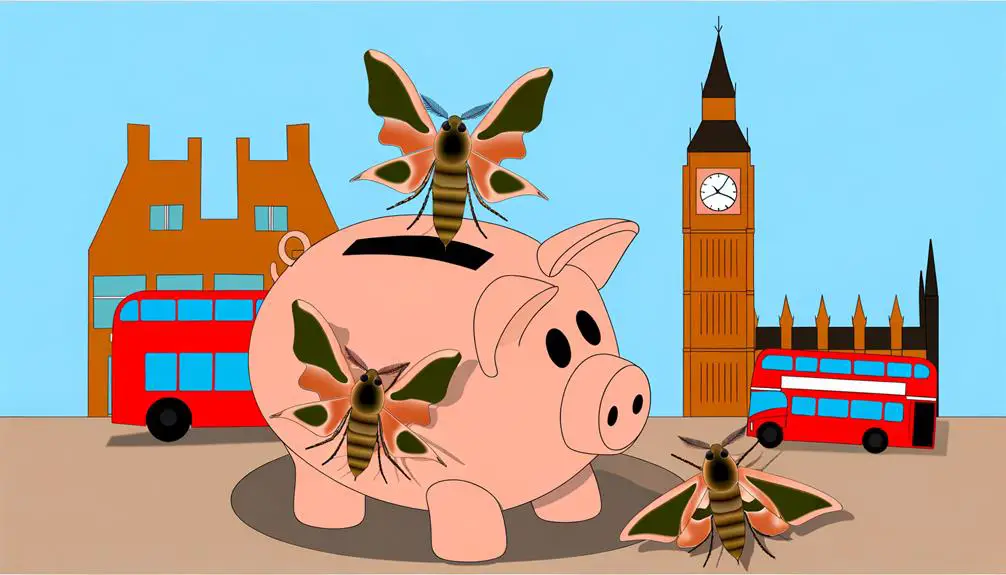In British slang, 'skint' means you're out of money, broke, absolutely penniless. This term isn't just casual slang; it's a reflection of the UK's economic history and societal attitudes toward financial stability. It's evolved from a colloquial expression to a recognized word in the Oxford English Dictionary, illustrating the dynamic nature of language and economic conditions. Being 'skint' fosters openness about financial hardships, encouraging discussions on money management and savings. It's a tribute to the enduring spirit and humor Brits employ when facing economic challenges. With its deep roots in British culture, understanding 'skint' offers insights into not just language, but also the collective experience of financial ups and downs. As you explore further, you'll uncover how 'skint' echoes through various facets of British society.
Origins of 'Skint'

Delving into the origins of 'skint,' one discovers it's deeply rooted in the socioeconomic fabric of British society, reflecting historical fluctuations in employment and financial stability. The term itself sparks an etymology debate, highlighting the rich tapestry of linguistic evolution that characterizes the English language. 'Skint,' meaning penniless or broke, isn't just a casual slang term; it's a mirror to the economic hardships and resilience of the British people over centuries.
As you explore further, you'll find that 'skint' has evolved from its initial appearances in the early 20th century. Its journey from colloquialism to a recognized term in the Oxford English Dictionary showcases the dynamic nature of language and how it adapts to societal changes. This linguistic evolution isn't merely about the word itself but reflects broader social and economic trends, including periods of prosperity, war, and recession.
Understanding 'skint' requires an appreciation of the etymology debate that surrounds it. Scholars argue about its precise origins, but there's agreement that its evolution is a demonstration of the adaptability of language in capturing the human condition. The term 'skint' stands as a cultural and linguistic marker, charting the economic ebbs and flows within British society.
'Skint' in British Culture
Understanding the term 'skint' within British culture offers you insight into both the everyday language and the socioeconomic landscape of the UK.
It's not just about being out of money; it's how this state influences social perceptions and interactions in daily life.
Origin of 'Skint'
To understand the origins of 'skint' in British culture, it's vital to acknowledge its roots in the early 20th century as a term symbolizing financial hardship. This etymology exploration reveals that 'skint', a slang term now synonymous with being out of money, underwent significant linguistic evolution.
Initially, it emerged from environments where financial struggles were a commonality. The word itself is believed to derive from 'skinned', suggesting something stripped or bare, which metaphorically applies to one's financial state. This linguistic evolution reflects not just a change in language, but also a cultural acknowledgment of economic conditions.
Over time, 'skint' has woven itself into the fabric of British vernacular, encapsulating the enduring spirit and humor in facing financial adversity.
Usage in Daily Life
Having explored the origins of 'skint', we now turn our attention to how this term permeates daily life in British culture, reflecting both linguistic nuances and socio-economic realities.
When you hear someone in the UK claim they're 'skint,' it's not just a casual remark but a candid admission of their financial situation. This term fosters a sense of camaraderie, encouraging open discussions about money, saving tips, and financial planning.
It's common to find Brits swapping advice on how to stretch a pound or sharing budget-friendly activities. 'Skint' isn't just slang; it's a reflection of the pragmatic approach many take towards managing their finances, emphasizing the importance of being financially savvy in everyday conversations.
This cultural quirk underscores the collective understanding of economic ups and downs.
Impact on Social Perceptions
How does the term 'skint' shape social perceptions within British culture, particularly in the way individuals view and discuss economic hardship?
By casually encapsulating a state of having no money, 'skint' normalizes financial struggle, subtly affecting how people internalize and externalize their economic situations.
It's not just an innocent slang; it carries weight in reinforcing financial stereotypes and class assumptions.
When you say someone's skint, you're not just commenting on their temporary lack of funds; you're potentially slotting them into a societal framework that views economic hardship through a lens of normalcy and inevitability.
This casual usage reflects and perpetuates a cultural attitude towards money, inadvertently shaping discussions around wealth, poverty, and class in British society.
Variations and Synonyms
You'll find that regional dialect differences across the UK give rise to a rich variety of slang, each with its own nuances and historical roots.
Through common usage examples, you'll see how these variations reflect local identities and social dynamics.
Understanding these synonyms and variations not only enriches your vocabulary but also offers a deeper insight into British culture and regional pride.
Regional Dialect Differences
While exploring British slang, you'll quickly discover that regional dialects introduce a fascinating array of variations and synonyms, deeply rooted in the cultural and historical landscapes of the UK. Accent influence plays a pivotal role in this diversity, shaping words and phrases in ways that reflect local identities.
Linguistic evolution, fueled by a myriad of social, economic, and historical factors, further enriches the tapestry of British slang. You'll find that terms used to describe similar concepts or items vary greatly from one region to another, offering a linguistic mirror to the UK's rich regional diversity.
Understanding these differences not only provides insight into the nuances of British slang but also into the complex cultural fabric of the nation.
Common Usage Examples
Delving into the world of British slang, you'll encounter a kaleidoscope of terms that vary significantly across regions, each carrying its own unique cultural signature.
The term 'skint' vividly encapsulates the concept of financial struggles, serving as a colloquial beacon for those traversing the choppy waters of economic hardship. When you say you're 'absolutely skint,' you're not just talking about being broke—you're conveying a broader narrative of scraping by, of piecing together budgeting tips to stretch every penny. It's a term that's as much about the resilience in the face of adversity as it's about the state of one's bank account.
'Skint' transcends mere financial status, embedding itself into the fabric of cultural dialogues about money, survival, and the pursuit of stability.
Usage in Everyday Conversations

In everyday conversations, British slang often pops up, offering a colorful glimpse into the culture and making interactions more spirited and authentic. Among these, 'skint' is a term you'll frequently encounter, especially in discussions revolving around finances. It's not just a word; it embodies a common financial state many find themselves in, making it a relatable term that integrates seamlessly into dialogues about money matters.
When you're chatting with friends or family, and the topic of financial advice or budgeting tips comes up, 'skint' serves as a succinct way to express the lack of funds without delving into specifics. It's a shorthand that everyone understands, allowing the conversation to move swiftly onto potential solutions or empathetic commiseration. This shared understanding fosters a sense of community and mutual support, encouraging open discussions on managing tight budgets and financial planning.
Moreover, using 'skint' in casual conversations highlights a culturally aware approach to discussing financial difficulties. It's a non-judgmental, colloquial term that softens the blow of financial hardship, making the topic less overwhelming and more approachable. This linguistic choice reflects an insightful understanding of how culture shapes the way financial issues are perceived and discussed in everyday life.
'Skint' in Media and Literature
Numerous instances of British media and literature have adeptly woven the slang term 'skint' into their narratives, reflecting a keen cultural insight into the economic realities faced by characters and, by extension, their audiences. You'll find that film portrayals often use 'skint' to add depth to characters struggling with financial hardship, painting a vivid picture of the socioeconomic challenges within the UK. These portrayals don't just serve as entertainment; they mirror the lived experiences of many, offering a lens through which viewers can reflect on societal issues.
Novel representations, on the other hand, use 'skint' to draw readers into the intimate realities of characters' lives, showcasing how financial woes can shape relationships, decisions, and life paths. These literary explorations provide a nuanced understanding of poverty and economic strain, encouraging readers to empathize with the characters' plights. Through both film and novel mediums, the term 'skint' transcends its status as mere slang, becoming a symbol of broader socioeconomic commentary. This highlights the power of media and literature not just to entertain, but to enlighten and provoke thought about the complexities of economic hardship in contemporary Britain.
The Social Impact of Skint

The term 'skint' carries a profound social impact, shaping perceptions and interactions within British society. When you're labeled as 'skint', it doesn't just reflect your financial status; it influences how you're viewed and treated by others. This condition nudges you towards adopting financial strategies and seeking budgeting tips to navigate through tight situations.
Understanding the social implications of being 'skint' helps in appreciating the resilience and creativity it fosters among individuals and communities. Here are five key points to ponder:
- Stigma and Solidarity: Being 'skint' can lead to stigma, yet it also fosters a sense of solidarity among those in similar situations.
- Innovation in Budgeting: Necessity breeds innovation, pushing individuals to come up with unique budgeting tips and financial strategies.
- Community Support Networks: The shared experience of being 'skint' often leads to the formation of support networks, offering advice and assistance.
- Cultural Representation: How society views being 'skint' is often reflected in media, impacting collective attitudes and policies.
- Economic Awareness: Experiencing or understanding 'skint' conditions fosters greater economic awareness and empathy towards financial struggles.
Frequently Asked Questions
How Does the Slang Term 'Skint' Affect Personal Relationships and Social Interactions Within British Communities, Particularly Among Different Age Groups and Social Classes?**
You'll find the term's use highlights both generational gaps and cultural implications, affecting how different ages and classes interact. It can either bond people through shared experiences or create divides based on financial situations.
Are There Any Notable Public Figures or Celebrities in the UK Who Have Openly Discussed Their Experiences or Views on Being 'Skint', and How Has This Influenced Public Perception or the Normalization of Financial Struggles?**
You've probably noticed celebrities chatting about being broke as if they're in a quirky indie film. This candidness, blending celebrity philanthropy with financial literacy programs, subtly shifts how we view and discuss money struggles.
In What Ways Has Digital Communication and Social Media Platforms Influenced the Usage and Spread of the Term 'Skint' Among Younger Generations Outside of the Uk?**
Digital communication and social media platforms have spread 'skint' globally through memes and cultural adaptation. You've seen how younger generations outside the UK adopt it, reflecting financial realities with humor and a touch of cultural awareness.
How Do Non-Native English Speakers or Immigrants in the UK Perceive and Adapt to the Use of 'Skint' in Everyday Language, Especially in Contexts of Financial Discussions or Negotiations?**
You're mastering language barriers and cultural adaptation like a pro, quickly learning that 'skint' isn't just about being broke. It's about fitting in, understanding local nuances, and making financial conversations more relatable and less formal.
What Role Does Humor Play in the Use of 'Skint' Within British Society, and How Does It Help in Coping With or Addressing Serious Financial Issues Among Friends, Family, or in Public Discourse?**
Humor plays a pivotal role in addressing financial struggles, as it fosters financial resilience. By joking about being 'skint,' you're not just lightening the mood; you're also culturally maneuvering tough times together.
Conclusion
So, you've explored into the world of 'skint,' uncovering its origins, cultural significance, and even its appearance in media.
Ironically, in a society obsessed with wealth, 'skint' captures the essence of not having a penny to one's name. This term, rich in history and meaning, highlights the ever-present gap between the haves and the have-nots.
It's a linguistic gem that, while indicating empty pockets, ironically fills our conversations with depth, reflecting the socioeconomic landscapes we navigate daily.







